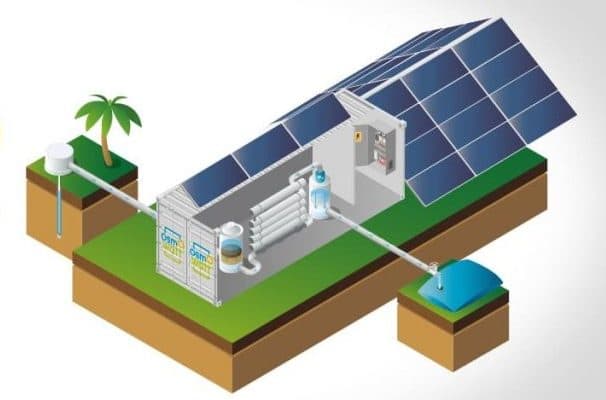The French company Mascara Nouvelles technologies has teamed up with its compatriot Ecosun Innovation to implement a new water treatment technology called Osmo-Watt®. This containerised solution, which operates using solar energy, will be distributed in remote areas of the African continent.
Mascara New Technologies is multiplying partnerships to improve the supply of drinking water in Africa. The young French company has signed a partnership with its compatriot Ecosun Innovation to launch Osmo-Watt®. This is a new solution that makes it possible to provide drinking water thanks to an easy-to-deploy containerised system for remote and hard-to-reach areas.
The containerised system consists of Mascara’s Osmosun® technology, which enables the desalination of sea and brackish water using solar energy, and Mobil-Watt®, a containerised solar system from Ecosun Innovation that is easy to deploy. According to Mascara, the pooling of these two technologies facilitates the installation and maintenance of the solution, thus reducing costs in remote areas of Africa where purchasing power is often very low. Osmo-Watt® can produce between 5 and 100 m3 of drinking water per day using solar energy.
The possibility of hybridisation
“The container’s fully solar-powered system offers complete autonomy from any external energy supply: diesel, electricity grid. On the other hand, if necessary, Osmo-Watt® can hybridise the energy sources to produce outside of sunny hours, and thus triple the production capacity”, says Mascara New Technologies.
Osmo-Watt® is thus part of the spin-offs of Mascara’s partnership strategy, which has chosen to work with other start-ups to improve access to drinking water in Africa. A few months ago, the young company based in Gellainville (France) signed a partnership with the energy company Mada Green Power to provide drinking water in the arid zones of Madagascar. The large island in the Indian Ocean has one of the lowest rates of access to drinking water in Africa with only 35% of its population consuming drinking water according to a report (2019) by the Madagascan Ministry of Water, Sanitation and Hygiene (MEAH).
Jean Marie Takouleu






